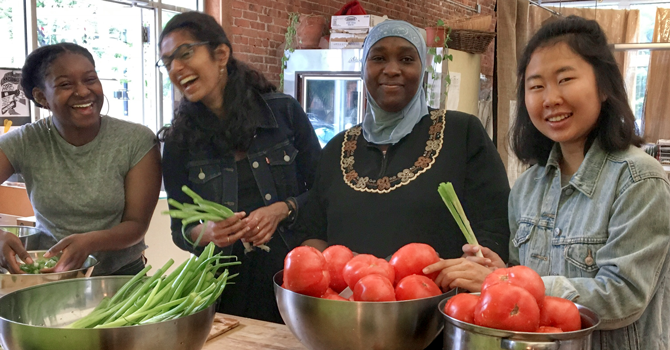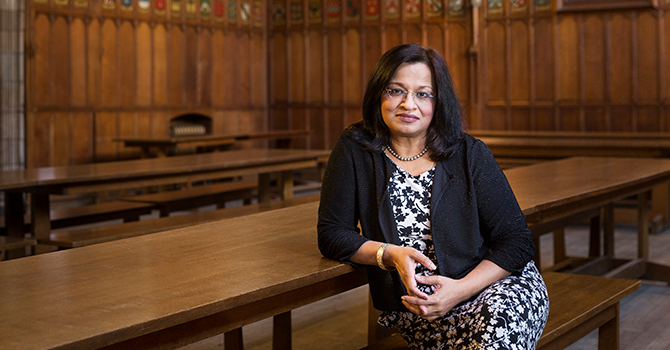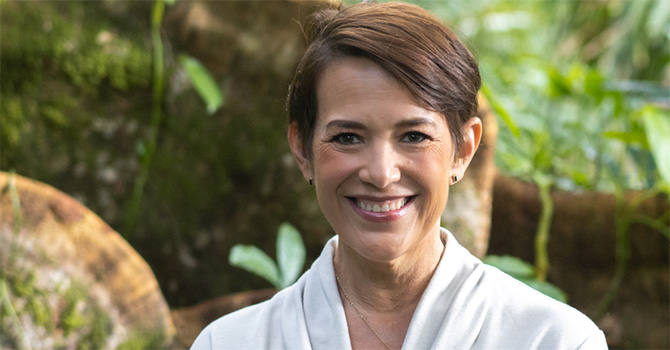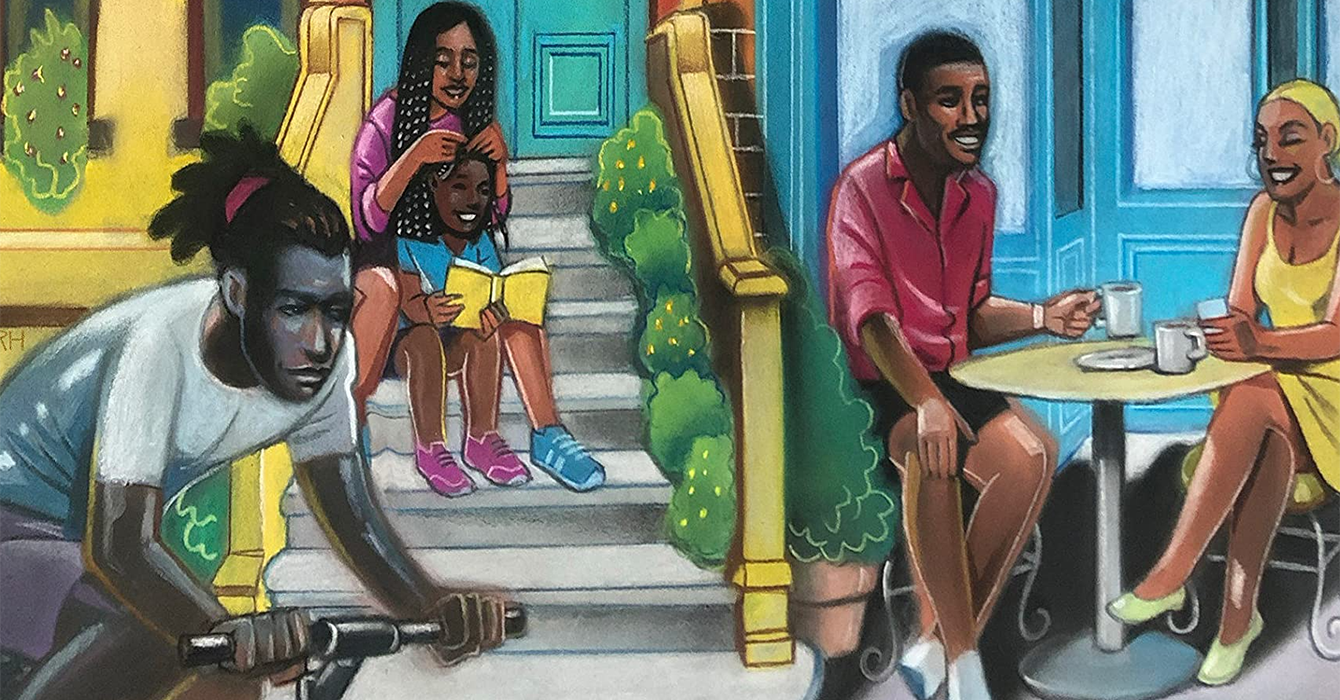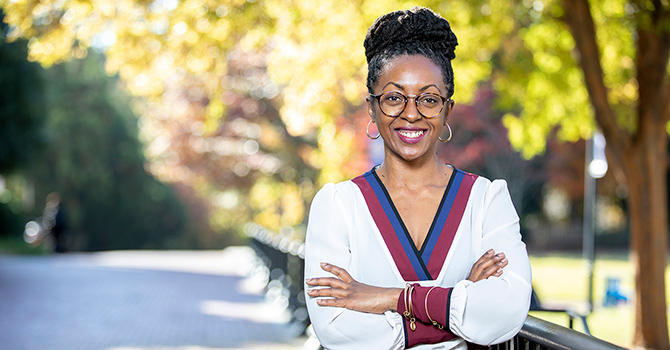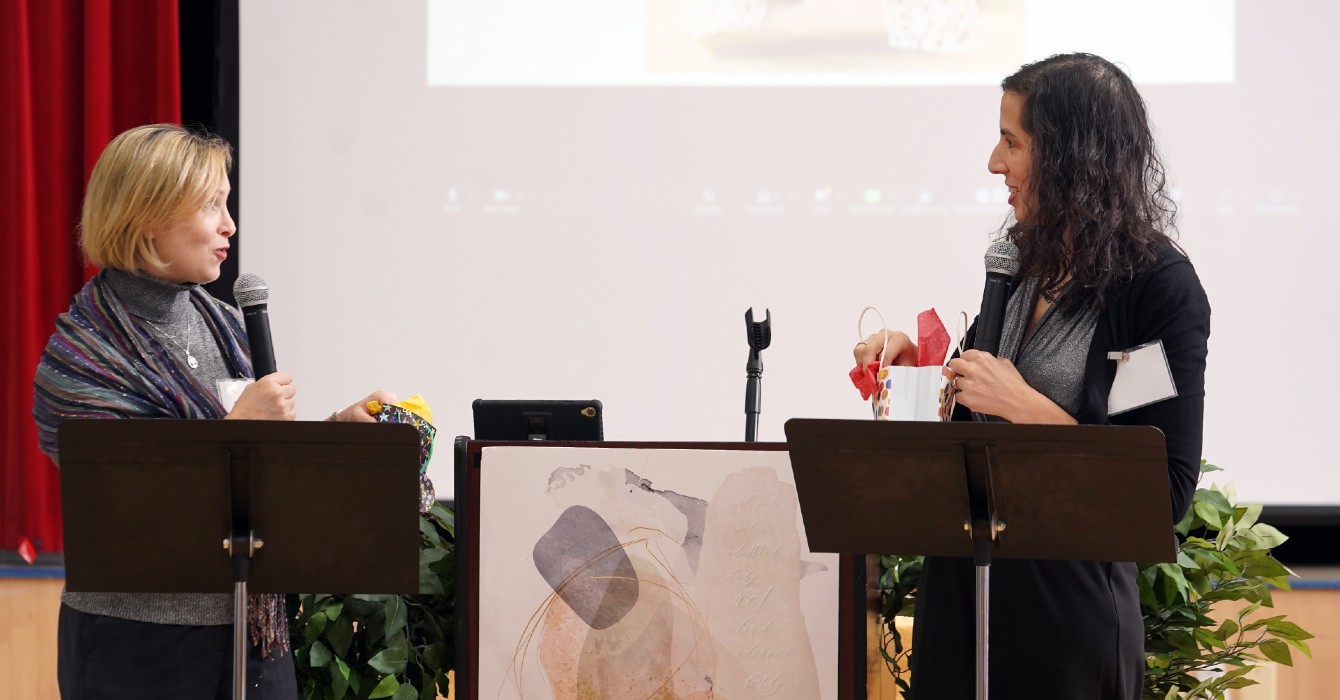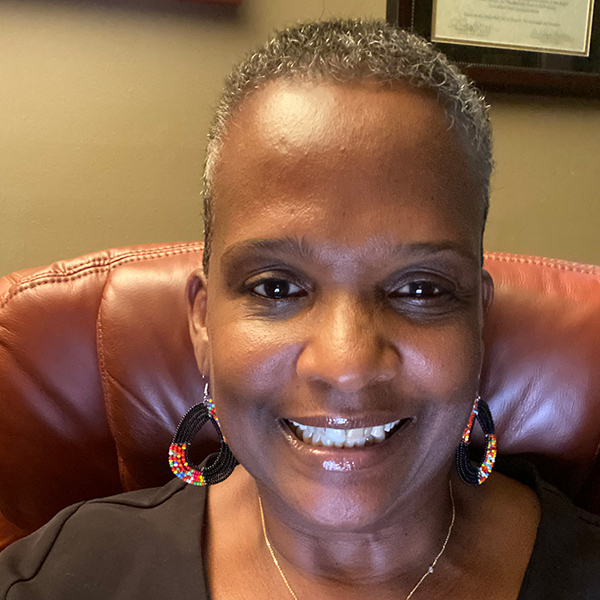For most of her years in America, Rawaa Ghazi felt like a stranger in a strange land.
In 2010, at the age of 21, Ghazi fled her home in Iraq and found refuge in New Haven, Connecticut. Hampered by a lack of English skills, she felt cut off from life and work here, a sense of displacement that persisted until earlier this year, when it was eased by an organization called Sanctuary Kitchen.
The nonprofit invited Ghazi to join its staff as a catering chef, and from that day six months ago, her life has been transformed by the power of food to bring people together.
Sanctuary Kitchen is an innovative New Haven program dedicated to training, employing and empowering immigrants and refugees through food service and intercultural exchange.
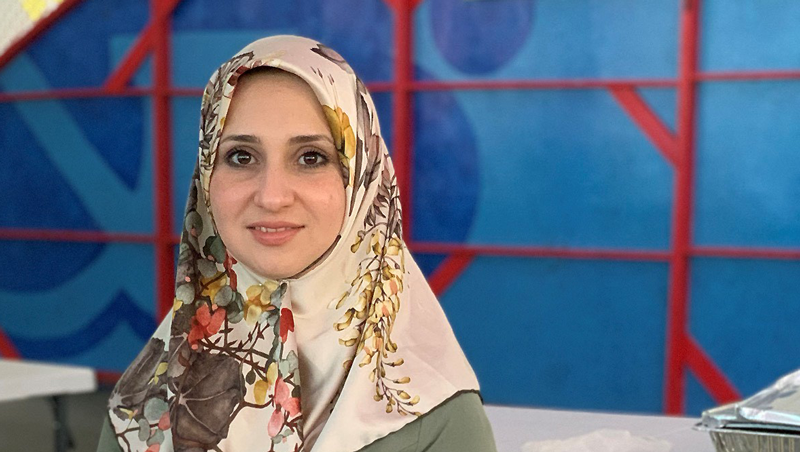
The program’s catering services, supper clubs and cooking classes harness skills and recipes brought from around the world, helping mitigate immigrants' cultural isolation and offering them the opportunity to make money. In the process, Sanctuary Kitchen adds savor to the community while raising awareness of refugees’ lives.
How might you invite others to share a skill or talent? What openings, new connections and relationships might that invitation create?
No longer sequestered at home with no means of independent income, Ghazi today is one of six paid part-time chefs in the catering kitchen, with women from Syria and Afghanistan who share her language, religion and regional food traditions.
“We are a good group, like a second family,” she said of her Sanctuary Kitchen friends. “Sanctuary Kitchen has really helped me. I am really thankful.”
Looking at gratitude from different perspectives
In August, Ghazi -- just a few months after joining Sanctuary Kitchen -- found herself in a private dining room at Yale Divinity School telling her story to a group of international scholars.
The academics -- professors of religion and theology from the U.S., U.K., Canada and Europe -- were at Yale to participate in a three-day workshop called “Gratitude: Love, Power and Indebtedness,” part of the larger “Gratitude: Christian and Muslim Perspectives” project organized by the University of Edinburgh’s School of Divinity.
After a day of presentations and discussions examining gratitude as a boon, tool, obligation and even burden of spiritual life, the 14 participants gathered in a small dining room presided over by a portrait of Calvinist preacher Jonathan Edwards.

With the aromas of the evening’s meal perfuming the room, the scholars had one more note of thanksgiving to consider before dinner was served, delivered by Chef Ghazi. Gratitude for the young Muslim Iraqi was neither an abstraction nor a matter of speculation.
Christians recognize gratitude as a central component to our faith. How does gratitude -- or thanks and praise -- undergird the work that you do?
Speaking in soft, tentative English, Ghazi told a tale of hardship and survival that began in Baghdad in the aftermath of the Iraq war. Her husband, an Iraqi national working with the U.S. military, had begun to receive death threats from an anti-American terrorist group.
As the threats continued and other workers were attacked, the couple grew ever more fearful for their lives and finally applied for a special visa to the United States. Leaving behind all they knew and owned, they escaped with their newborn son to the U.S. Resettled in New Haven, Ghazi’s husband found work on the night shift at Walmart, and Ghazi stayed home to care for the baby in their small apartment.
“He worked in the night and came home and had to sleep,” she said. “I could not speak any English and did not know anyone. I was all alone and afraid all the time. It was really hard.”
Two more children quickly followed, and though Ghazi eventually learned rudimentary English at a local community college, the language barrier, demands of childcare and unrelieved timidness hampered her adjustment to life in the U.S. With no outside work and few friends, the isolation persisted for nearly nine years, until she learned of Sanctuary Kitchen.
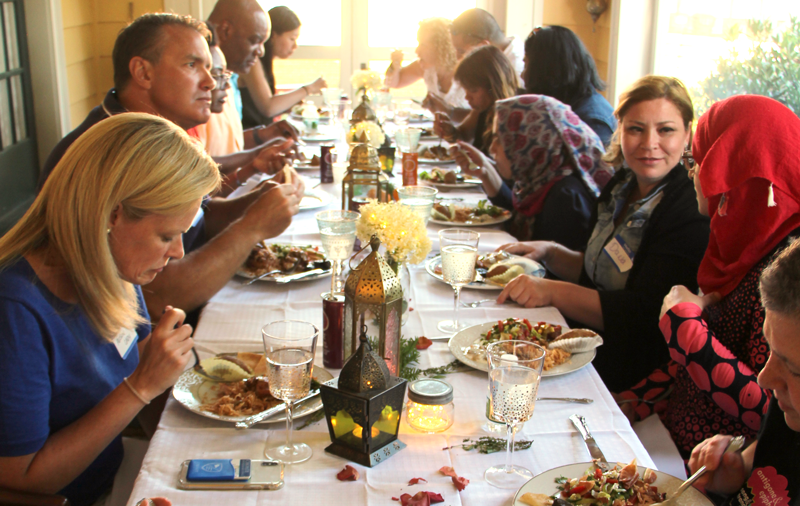
The nonprofit program is part of an international movement of so-called food-empowerment projects that have emerged to meet the needs of “tempest-tost” immigrants like Ghazi.
Creating access to entrepreneurship
Described as “food incubators for refugee resettlement” by the journal Nonprofit Quarterly, these food-centered charities have taken root across the country, from Salt Lake City to Washington, D.C., as well as internationally, in cities including Toronto, London and Paris. New York City has three such programs.
Refugee-centered programs are a subset of a larger system of food-based incubators that the National League of Cities numbers at more than 200 facilities nationwide, programs founded on the model of tech incubators to provide shared workspace, mentoring and training in everything from food science to launching a business.
A 2016 NLC report found that food-centered incubators “create more equitable access to entrepreneurship among diverse populations” and “increase … gender equity in the food industry.”
Sanctuary Kitchen is operated by CitySeed, a New Haven nonprofit that promotes regional farming, food justice, and “safe and equitable food systems,” said CitySeed’s kitchen program manager, Sumiya Khan, who also spoke at the Yale dinner.
Khan, who co-founded the Sanctuary Kitchen program in 2017 as a “passion project,” manages all aspects of the organization’s cooking, food education and food business incubation.
Her parents came to the U.S. from India in the 1960s as graduate students; they were engaged in political activities, she said, such as organizing one of the first Muslim student associations in the U.S. and advocating for Muslim rights decades before the subject was in the national consciousness.
Have you ever thought about food as political? What are some of the ways in which food is grown, processed, distributed, sold, cooked and served in your community? Who benefits and who suffers in those processes?
In her growing-up years in San Jose, California, Khan recalled, the conversation at home was often about human rights and humanitarian causes.
“My parents always felt it was their duty to speak out and do whatever they could to confront injustice,” she said. “I grew up going to protests.”
Despite the fact that Khan’s mother is also “an amazing cook” of traditional Indian food, the daughter did not develop her interest in food preparation or cultural cuisine until she was studying for a master’s degree in nutrition.
“I took my first cooking class in grad school,” she said, and though she now cooks and bakes as a hobby, she makes no claims to being a foodie.
A registered dietician by profession, Khan conceived of Sanctuary Kitchen as a way to bring together the political ethos of her parents, her own commitment to social justice, and her knowledge of food and nutrition.
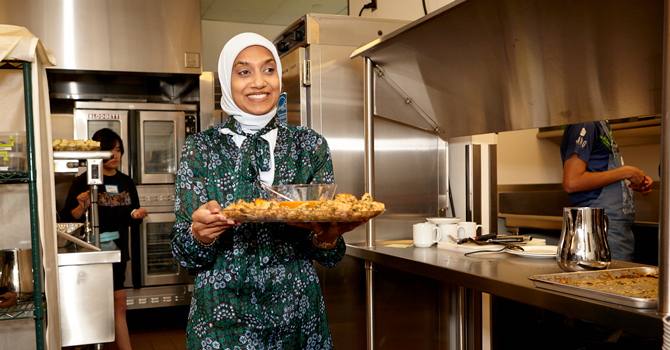
The program began modestly two years ago with cooking classes taught at the CitySeed kitchen by immigrant chefs. Expansion came quickly; soon, participants were preparing supper club meals in private homes, hosting a prominent public food bazaar and launching the catering program.
The mission, Khan said, is to “create community through food” by “building economic opportunities for refugees and celebrating the diversity and stories of the chefs and the cuisine.”
Whose untold stories need to be heard in your congregation or institution? What settings might showcase those stories?
The program has worked with nearly 50 chefs, mostly women from the Middle East, Central America and Africa, providing employment and helping build private businesses. One participant has gone on to run a professional kitchen, two others have opened their own restaurant, and another has started a catering company.
A banquet of thanks and praise
Basic to all the monotheistic religions are themes of safe passage and thanksgiving, so Sanctuary Kitchen’s origin story was the perfect complement to an academic gathering focused on gratitude.
Mona Siddiqui, professor of Islamic and interreligious studies at the University of Edinburgh, developed the project of scholarly workshops examining gratitude from Christian and Muslim perspectives and immediately saw the connection between Sanctuary Kitchen’s vocation and her theme.
“Food is absolutely fundamental to relationships,” Siddiqui said. The Sanctuary Kitchen chefs “provide food in an environment where they feel they’ll be able to flourish,” an opportunity that fosters a common and “innate sense of gratitude.”

Khan agrees. Sanctuary Kitchen regards gratefulness as “a necessary part of our work,” she said. “It’s a way to showcase the skills and resilience of these women. We see firsthand the tangible difference our program is making. The impact is huge.”
“The connections we create are a way of showing gratitude to the chefs we work with and how their presence enriches the fabric of the greater New Haven area,” she said.
New Haven, as its name suggests, has a long history of welcoming immigrants and outsiders. In 1839, the city gave refuge to the mutinying Africans of the slave ship Amistad, eventually folding them into the community, an event memorialized by a sculpture outside City Hall.
In 2018, the city celebrated its diverse immigrant population with a public art installation that ringed the central New Haven Green -- also the site of an annual World Refugee Day.
Earlier this year, Mayor Toni Harp underscored the city’s roots when she declared New Haven a “sanctuary city” in response to sweeping arrests of undocumented immigrants by the Department of Homeland Security’s Immigration and Customs Enforcement (ICE) unit.
How do individuals or organizations in your area create community through food? How do you see the power of food as transformational in those instances?
Sanctuary Kitchen was founded in April 2017, just as the Trump administration ramped up anti-immigration policies. And while the program’s formation was not a direct response to ICE policies, Khan said, its presence does serve to declare the dignity and value of immigrants to the community.
In the dining room at Yale, when the time for talk was over, Ghazi unveiled a scrumptious array of traditional Iraqi recipes, all passed down from her mother and generations of women before her.

There was lamb biryani, a dish of spiced basmati rice with lamb, nuts and vegetables; temen lubiyah, a spiced pilaf with green beans; and tepsi baytenjan, a casserole of eggplant, potatoes and peppers. Alongside were cucumber and yogurt salad, apricot-prune stew, handmade flatbread and sesame tea biscuits.
The feast transported the scholar-diners to Ghazi’s childhood village in southern Iraq, while the chef, with her sweet and spiced delights, assumed the mantle of host to a table of friends. In that small room, the worlds of theology and culinary art came together in a banquet of thanks and praise.
Questions to consider
Questions to consider
- How might you invite others to share a skill or talent? What openings, new connections and relationships might that invitation create?
- Gratitude “is a necessary part” of the work Sanctuary Kitchen does and is the theme of the scholarly project developed by Mona Siddiqui. Christians recognize gratitude as a central component of our faith as well. How does gratitude -- or thanks and praise -- undergird the work that you do?
- Khan’s concept for Sanctuary Kitchen grew, in part, out of “the political ethos of her parents” and “her own commitment to social justice.” Have you ever thought about food as political? What are some of the ways in which food is grown, processed, distributed, sold, cooked and served in your community? Who benefits and who suffers in those processes?
- Sanctuary Kitchen celebrates “the diversity and stories of the chefs and the cuisine.” Whose untold stories need to be heard in your congregation or institution? What settings might showcase those stories?
- How do individuals or organizations in your area create community through food? How do you see the power of food as transformational in those instances?

